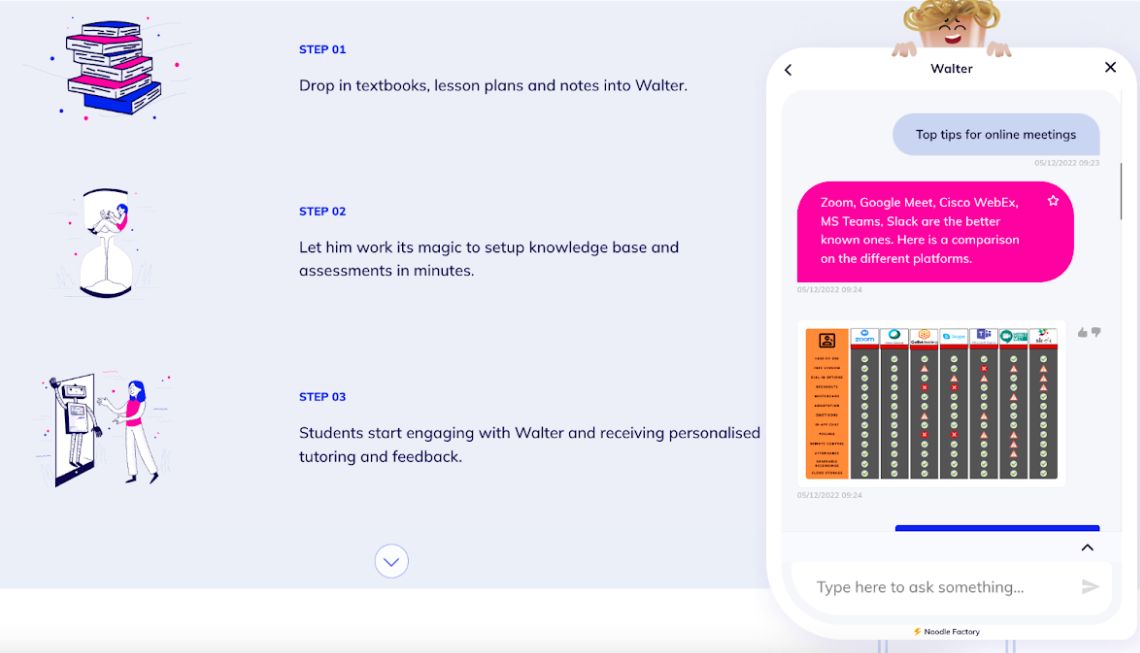Is the future of education in AI?
By Rachel Teng
GovInsider sits down with Koo Sengmeng, Senior Deputy Director of AI Singapore, to find out how the organisation is freeing up more time for teachers by furthering edutech innovation and adoption.

AI teaching assistant platforms now enable teachers to engage students through personalised tutoring, grading, and feedback. Image: Canva
“Effective teaching may be the hardest job there is,” said American psychiatrist William Glasser. Indeed, teachers bear the brunt of shaping the formative years of every child, a high-stakes role in society that trickles down into the success of every other profession and industry.
But as the skills required of the worker today become increasingly diverse, teaching has also become more complex. This has made teaching more stressful than ever before.
In September 2021, more than 80 per cent of teachers reported having their mental health negatively impacted, with 80.6 per cent indicating they worked more than 45 hours a week, reported The Straits Times. Many also reported that their personal relationships and physical health suffered from the intensity of teaching.
Simple pay raises no longer alleviate workload issues for teachers, reported Today Online in August 2022. What, then, can help teachers build longevity and sustainability in their careers?
Enter AI. “Teachers are one of the most hardworking workers among all professions. They handle lesson planning, marking, and meeting with parents. But if you want to talk about actual teaching, many probably have screen time with their students for three hours a day,” says Koo Sengmeng, Senior Deputy Director of AI Singapore.
AI Singapore was launched in 2019, and functions as a long-term task force, bringing together ecosystem partners keen on nudging industries toward adopting AI at scale, according to Koo.
On the education front, AI Singapore aims to build national literacy in AI and develop edutech through working with various classroom stakeholders and partners.
GovInsider sits down with Koo to find out how teachers can harness AI to focus more on teaching and less on teaching administration.
Replacing tasks, not jobs
“Many have the preconceived notion that AI replaces jobs, when in fact, it replaces tasks,” Koo tells GovInsider. Particularly in teaching, arguably the most humanised profession in the world, teachers can be rest assured that AI will never fully replace the jobs of teachers, Koo added.
Take for example Noodle Factory, an AI teaching assistant platform that enables teachers to engage students through personalised tutoring, grading, and feedback in the form of AI chatbots, without teachers’ direct involvement.
“When we entered the education industry ourselves, one of the things that we found most difficult was how to scale what educators do. We always needed to give personalised attention to each of our students because every student is different, but it’s generally not possible because there’s just not enough time to do it,” said Yvonne Soh, CEO and co-founder of Noodle Factory at the AWS Public Sector Summit in October 2022.
Teachers can drop in any of their lesson notes and textbooks onto the simple-to-use interface, and these materials will be processed and converted into a knowledge base using natural language processing. This knowledge base will then be delivered to students in the form of question-answer pairs through the conversational chatbot.

“It’s meant to assist rather than replace. The AI creates assessments and ‘FAQs’ – things that are often very time-consuming for our teachers to do themselves,” said Soh. With these foundational tasks automated using AI, teachers become more in control of what and how to further students’ learning.
Developing and integrating edutech
On the front of furthering the adoption of education tech, Koo says that AI Singapore aims to build a “national level AI system” that is built right into existing student learning spaces.
Currently, the Ministry of Education has developed a centralised Student Learning Space (SLS) that aggregates teaching and learning resources as well as other academic materials. “While the current iteration of the SLS is still in the form of a basic learning management platform, we hope to supplement this with intelligent recommendation systems and assessment,” says Koo.
Under the nationwide strive for digital literacy, every secondary school student will be equipped with a personal learning device by 2028. Extrapolated together with AI capabilities, it is not difficult to envision the SLS serving as an intelligent teaching assistant for all public school teachers across the nation, Koo says.
AI Singapore is also pushing for AI to solve other problems in the education sector, such as the gradual loss of mother tongue proficiency in newer generations of Singaporeans.
In the past decade, the percentage of English-speaking households grew from 32.3 to 48.3 per cent, according to the Singapore Department of Statistics. Consequently, this also means that the proportion of mother-tongue-speaking households are on a decline. This lack of exposure at home causes children to pick up their Mother Tongues less fluently, reported CNA.
In 2019, Prime Minister Lee Hsien Loong said that will cause the Singaporean workforce to lose its bilingual competitive edge. To address this, the AI in Education Grand Challenge aims to encourage AI innovation to enhance Mother Tongue Language learning for primary school students in Singapore. While the outcome of the challenge is specified, it is up to the teams to pick their own approach and execution of the project, Koo tells GovInsider.
“Singapore is digitally transforming at different paces across industries, and it is important that we don’t merely rely on top-down but also bottom-up approaches. While AI Singapore works at the ministerial level, classroom stakeholders and individual changemakers should work to start introducing AI within our schools,” says Koo.